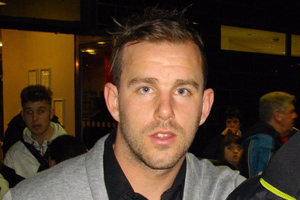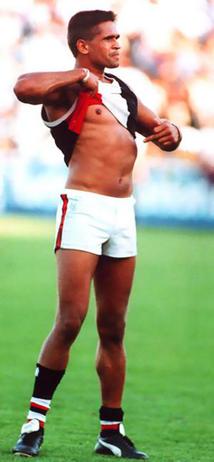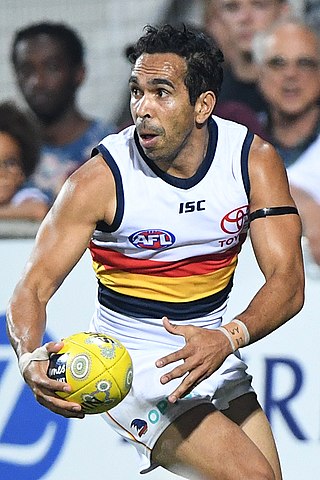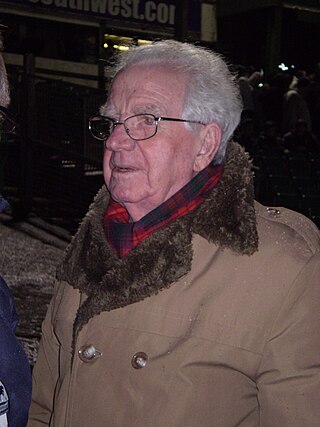Related Research Articles

Michael Long is a former Australian rules footballer of Aboriginal descent who became a spokesperson for Indigenous rights and against racism in sport in Australia.

David Barry Kitson is an English former professional footballer who played as a forward.

Lee David Bowyer is an English football manager and former professional player. He is the head coach of Montserrat.

Rowan Lewis Vine is an English former footballer.
Stephen Edward Claridge is an English football pundit, coach and former professional player who is currently the manager of Fleetlands. He was a pundit for BBC Sport football shows including Football Focus and The Football League Show, until 2014 when he became both manager and a director at newly formed Salisbury.

Neil Elvis "Nicky" Winmar is a former Australian rules footballer, best known for his career for St Kilda and the Western Bulldogs in the Australian Football League (AFL), as well as South Fremantle in the West Australian Football League. An Indigenous Australian man, he was the first Aboriginal footballer to play 200 games in the AFL, and was named in the Indigenous Team of the Century in 2005. He was involved in several incidents of racial vilification during his career, and a photograph of Winmar responding to one such incident during the 1993 season has been described as one of the most memorable images in Australian sporting history.

Jason Joseph Euell is a former professional footballer who played as either a forward or a midfielder. He is currently assistant head coach of Cambridge United.

Noel Lloyd George Blake is a former professional footballer and current coach. He was formerly the head coach of the England national under-19 football team. He played in the Football League for Aston Villa, Shrewsbury Town, Birmingham City, Portsmouth, Leeds United, Stoke City, Bradford City and Exeter City, and in the Scottish Football League for Dundee.

Edward Robert Betts III is a former Australian rules football player who played as a forward for Carlton and Adelaide in the Australian Football League between 2005 and 2021. As of 2024 he is an educator and mentor to Indigenous Australian youth, heading up the Eddie Betts Foundation.
Racism in association football is the abuse of players, officials, and fans because of their skin colour, nationality, or ethnicity. Some may also be targeted because of their association with an opposing team, although there have been instances of individuals being targeted by their own fans. The topic of racism in association football has been widely covered by the media and in academic studies. There have been a range of responses by various associations, such as FIFA and UEFA, as well as by teams, and individual players and managers to address the problem.

Mario Balotelli Barwuah is an Italian professional footballer who plays as a forward for Serie A club Genoa.
Garry Foulds is a former Australian rules footballer who played 300 games for the Essendon Football Club between 1974 and 1989. Described as "a ball magnet", Foulds spent the majority of his career playing on the wing or floating across the half-back line. He made his Victorian Football League (VFL) debut against Fitzroy in round 8 1974, after playing in the Essendon under–19s. He struggled to hold his place in the side before becoming a regular in 1977. Foulds was part of Essendon's Grand Final winning sides over Hawthorn in 1984 and 1985, along with playing in the 1983 Grand Final loss against the same opposition.
Racism in sports has been a prevalent issue throughout the world. The Human Rights and Equal Opportunity Commission (HREOC) released a report in 2007 stating that racial abuse and vilification are commonplace in international sports, in places such as Australia, Europe, and America.

Alexander Govan was a Scottish professional footballer who played at outside left. Most of his career was spent with Plymouth Argyle and with Birmingham City during their most successful period in the 1950s, and he also had a short spell with Portsmouth. He is credited with being responsible for Birmingham's fans adopting Harry Lauder's song "Keep right on to the end of the road" as their anthem.
Stanley John Matthews is an English former professional tennis player. He became Wimbledon Boys' Champion in 1962 and reached the second round of the French Open, Wimbledon and the US Open. He is the son of former professional footballer Sir Stanley Matthews (1915-2000).
Racism in sport in Australia has a long history, with one researcher finding examples from the 19th century. Since the 1990s, there have been a number of cases of racial vilification reported, with the various codes of sport tackling the problem in a variety of ways.

"Colour of Your Jumper" is a song written by Australian singer songwriter Archie Roach in 1993, following an incident where Indigenous Australian Football League player Nicky Winmar was receiving racial abuse from spectators resulting in Winmar lifting up his jumper and, facing to the crowd, pointed to his skin. A demo of this version was later included on the 2013 compilation album Creation.
On 19 October 2018, an incident occurred on a Ryanair flight FR9015 from Barcelona to London Stansted. During the incident, David Mesher, a 70-year-old white man from Birmingham, racially abused Delsie Gayle, a 77-year-old black woman from East London, who was seated next to him. After she was slow to move from her seat, he became abusive, using expletives against her and referring to her as a "stupid ugly cow" and an "ugly black bastard". Various passengers and staff asked Mesher to desist from his behaviour. Staff ultimately decided that he should remain in his seat rather than being removed from the plane, with Gayle being asked to move seats instead.
Racism in English football is the abuse of players, officials, and fans because of their skin colour, nationality, or ethnicity. Some may also be targeted because of their association with an opposing team, but there have also been instances of individuals being targeted by their own fans. The topic of racism in association football has been widely covered by the media as well as academic studies. There have been a range of responses by various associations, such as FIFA and UEFA, as well as by teams, and individual players and managers to address the problem.
References
- ↑ "Birmingham City : 1946/47–2007/08". UK A–Z Transfers. Neil Brown. Retrieved 29 April 2009.
- ↑ Moran, Richie (2000). "Racism in Football: A Victim's Perspective". In Garland, Jon; Malcolm, Dominic & Rowe, Michael (eds.). The future of football. Routledge. pp. 190–98. ISBN 0-7146-5068-4.
- 1 2 Matthews, Tony (1995). Birmingham City: A Complete Record. Derby: Breedon Books. p. 111. ISBN 978-1-85983-010-9.
- ↑ Matthews, p. 226.
- ↑ Chaudhary, Vivek (23 April 2004). "Ugly Side of the Beautiful Game". The Guardian . Retrieved 19 June 2009.
- ↑ Crabbe, Tim; Back, Les & Solomos, John (2001). The Changing Face of Football: Racism, Identity and Multiculture in the English Game. Berg Publishers. pp. 149–50. ISBN 1-85973-483-9.
He recounted how when he was playing for Birmingham City, the manager had: 'Called me into his office and asked me why I had dreadlocks. And when I explained that it was a reaffirmation of my African heritage it was met with derision, and to me, having explained it was part of my heritage – whatever corner of the globe you come from – he had actually insulted my whole heritage ... And I told him, with my tongue pretty much in my cheek, that ... if I should have my hair cut then why couldn't he have elocution lessons to change his Glaswegian accent, which didn't go down too favourably and I didn't play in the first team again strangely enough.'
- ↑ Hubbard, Alan (5 March 2000). "U-turns, No 10 and the Palace". The Independent . Archived from the original on 19 June 2009. Retrieved 19 June 2009.
- ↑ Lawton, James (17 May 2005). "Moran – a man of principle". The Independent . Archived from the original on 19 June 2009. Retrieved 19 June 2009.
- ↑ "Footballer books library success". Kick It Out. 17 October 2005. Retrieved 17 June 2009.